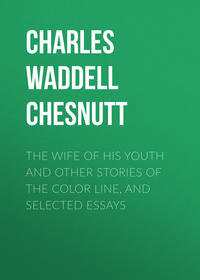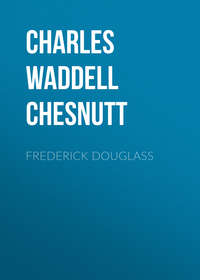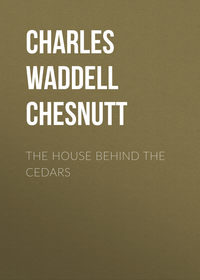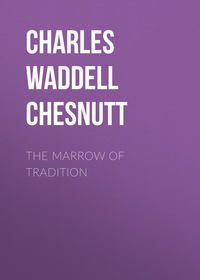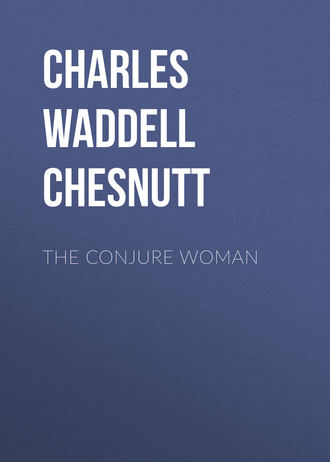 полная версия
полная версияThe Conjure Woman
"De nex' day atter he come back, little Mose wuz mo' pearter en better 'n he had be'n fer a long time. But to'ds de een' er de week he 'mence' ter git res'less ag'in, en stop' eatin', en Aun' Nancy kyared 'im down ter Aun' Peggy once mo', en she tu'nt 'im ter a mawkin'-bird dis time, en sont 'im off ter see his mammy ag'in.
"It didn' take him long fer ter git dere, en w'en he did, he seed his mammy standin' in de kitchen, lookin' back in de d'rection little Mose wuz comin' fum. En dey wuz tears in her eyes, en she look' mo' po'ly en peaked 'n she had w'en he wuz down dere befo'. So little Mose sot on a tree in de ya'd en sung, en sung, en sung, des fittin' ter split his th'oat. Fus' Sis' Becky did n' notice 'im much, but dis mawkin'-bird kep' stayin' roun' de house all day, en bimeby Sis' Becky des 'magine' dat mawkin'-bird wuz her little Mose crowin' en crowin', des lack he useter do w'en his mammy would come home at night fum de cotton-fiel'. De mawkin'-bird stayed roun' dere 'mos' all day, en w'en Sis' Becky went out in de ya'd one time, dis yer mawkin'-bird lit on her shoulder en peck' at de piece er bread she wuz eatin', en fluttered his wings so dey rub' up agin de side er her head. En w'en he flewed away 'long late in de ebenin', des 'fo' sundown, Sis' Becky felt mo' better 'n she had sence she had heared dat hummin'-bird a week er so pas'. En dat night she dremp 'bout ole times ag'in, des lack she did befo'.
"But dis yer totin' little Mose down ter ole Aun' Peggy, en dis yer gittin' things fer ter pay de cunjuh 'oman, use' up a lot er Aun' Nancy's time, en she begun ter git kinder ti'ed. 'Sides dat, w'en Sis' Becky had be'n on de plantation, she had useter he'p Aun' Nancy wid de young uns ebenin's en Sundays; en Aun' Nancy 'mence' ter miss 'er monst'us, 'speshly sence she got a tech er de rheumatiz herse'f, en so she 'lows ter ole Aun' Peggy one day:—
"'Aun' Peggy, ain' dey no way you kin fetch Sis' Becky back home?'
"'Huh!' sez Aun' Peggy, 'I dunno 'bout dat. I'll hafter wuk my roots en fin' out whuther I kin er no. But it'll take a monst'us heap er wuk, en I can't was'e my time fer nuffin. Ef you'll fetch me sump'n ter pay me fer my trouble, I reckon we kin fix it.'
"So nex' day Aun' Nancy went down ter see Aun' Peggy ag'in.
"'Aun' Peggy,' sez she, 'I is fotch' you my bes' Sunday head-hankercher. Will dat do?'
"Aun' Peggy look' at de head-hankercher, en run her han' ober it, en sez she:—
"'Yas, dat'll do fus'-rate. I's be'n wukkin' my roots sence you be'n gone, en I 'lows mos' lackly I kin git Sis' Becky back, but it 's gwine take fig'rin' en studyin' ez well ez cunj'in'. De fus' thing ter do'll be ter stop fetchin' dat pickaninny down heah, en not sen' 'im ter see his mammy no mo'. Ef he gits too po'ly, you lemme know, en I'll gib you some kin' er mixtry fer ter make 'im fergit Sis' Becky fer a week er so. So 'less'n you comes fer dat, you neenter come back ter see me no mo' 'tel I sen's fer you.'
"So Aun' Peggy sont Aun' Nancy erway, en de fus' thing she done wuz ter call a hawnet fum a nes' unner her eaves.
"You go up ter Kunnel Pen'leton's stable, hawnet,' sez she, 'en sting de knees er de race hoss name' Lightnin' Bug. Be sho' en git de right one.'
"So de hawnet flewed up ter Kunnel Pen'leton's stable en stung Lightnin' Bug roun' de laigs, en de nex' mawnin' Lightnin' Bug's knees wuz all swoll' up, twice't ez big ez dey oughter be. W'en Kunnel Pen'leton went out ter de stable en see de hoss's laigs, hit would 'a' des made you trimble lack a leaf fer ter heah him cuss dat hoss trader. Howsomeber, he cool' off bimeby en tol' de stable boy fer ter rub Lightnin' Bug's laigs wid some linimum. De boy done ez his marster tol' 'im, en by de nex' day de swellin' had gone down consid'able. Aun' Peggy had sont a sparrer, w'at had a nes' in one er de trees close ter her cabin, fer ter watch w'at wuz gwine on 'roun' de big house, en w'en dis yer sparrer tol' 'er de hoss wuz gittin' ober de swellin', she sont de hawnet back fer ter sting 'is knees some mo', en de nex' mawnin' Lightnin' Bug's laigs wuz swoll' up wuss 'n befo'.
"Well, dis time Kunnel Pen'leton wuz mad th'oo en th'oo, en all de way 'roun', en he cusst dat hoss trader up en down, fum A ter Izzard. He cusst so ha'd dat de stable boy got mos' skeered ter def, en went off en hid hisse'f in de hay.
"Ez fer Kunnel Pen'leton, he went right up ter de house en got out his pen en ink, en tuk off his coat en roll' up his sleeves, en writ a letter ter dis yer hoss trader, en sezee:—
"'You is sol' me a hoss w'at is got a ringbone er a spavin er sump'n, en w'at I paid you fer wuz a soun' hoss. I wants you ter sen' my nigger 'oman back en take yo' ole hoss, er e'se I'll sue you, sho 's you bawn.'
"But dis yer man wa'n't skeered a bit, en he writ back ter Kunnel Pen'leton dat a bahg'in wuz a bahg'in; dat Lightnin' Bug wuz soun' w'en he sol' 'im, en ef Kunnel Pen'leton did n' knowed ernuff 'bout hosses ter take keer er a fine racer, dat wuz his own fune'al. En he say Kunnel Pen'leton kin sue en be cusst fer all he keer, but he ain' gwine ter gib up de nigger he bought en paid fer.
"W'en Kunnel Pen'leton got dis letter he wuz madder 'n he wuz befo', 'speshly 'ca'se dis man 'lowed he did n' know how ter take keer er fine hosses. But he could n' do nuffin but fetch a lawsuit, en he knowed, by his own 'spe'ience, dat lawsuits wuz slow ez de seben-yeah eetch and cos' mo' d'n dey come ter, en he 'lowed he better go slow en wait awhile.
"Aun' Peggy knowed w'at wuz gwine on all dis time, en she fix' up a little bag wid some roots en one thing en ernudder in it, en gun it ter dis sparrer er her'n, en tol' 'im ter take it 'way down yander whar Sis' Becky wuz, en drap it right befo' de do' er her cabin, so she 'd be sho' en fin' it de fus' time she come out'n de do'.
"One night Sis' Becky dremp' her pickaninny wuz dead, en de nex' day she wuz mo'nin' en groanin' all day. She dremp' de same dream th'ee nights runnin', en den, de nex' mawnin' atter de las' night, she foun' dis yer little bag de sparrer had drap' in front her do'; en she 'lowed she'd be'n cunju'd, en wuz gwine ter die, en ez long ez her pickaninny wuz dead dey wa'n't no use tryin' ter do nuffin nohow. En so she tuk 'n went ter bed, en tol' her marster she 'd be'n cunju'd en wuz gwine ter die.
"Her marster lafft at her, en argyed wid her, en tried ter 'suade her out'n dis yer fool notion, ez he called it,—fer he wuz one er dese yer w'ite folks w'at purten' dey doan b'liebe in cunj'in',—but hit wa'n't no use. Sis' Becky kep' gittin' wusser en wusser, 'tel fin'lly dis yer man 'lowed Sis' Becky wuz gwine ter die, sho' 'nuff. En ez he knowed dey had n' be'n nuffin de matter wid Lightnin' Bug w'en he traded 'im, he 'lowed mebbe he could kyo' 'im en fetch 'im roun' all right, leas'ways good 'nuff ter sell ag'in. En anyhow, a lame hoss wuz better 'n a dead nigger. So he sot down en writ Kunnel Pen'leton a letter.
"'My conscience,' sezee, 'has be'n troublin' me 'bout dat ringbone' hoss I sol' you. Some folks 'lows a hoss trader ain' got no conscience, but dey doan know me, fer dat is my weak spot, en de reason I ain' made no mo' money hoss tradin'. Fac' is,' sezee, 'I is got so I can't sleep nights fum studyin' 'bout dat spavin' hoss; en I is made up my min' dat, w'iles a bahg'in is a bahg'in, en you seed Lightnin' Bug befo' you traded fer 'im, principle is wuth mo' d'n money er hosses er niggers. So ef you'll sen' Lightnin' Bug down heah, I'll sen' yo' nigger 'oman back, en we'll call de trade off, en be ez good frien's ez we eber wuz, en no ha'd feelin's.'
"So sho' 'nuff, Kunnel Pen'leton sont de hoss back. En w'en de man w'at come ter bring Lightnin' Bug tol' Sis' Becky her pickaninny wa'n't dead, Sis' Becky wuz so glad dat she 'lowed she wuz gwine ter try ter lib 'tel she got back whar she could see little Mose once mo'. En w'en she retch' de ole plantation en seed her baby kickin' en crowin' en holdin' out his little arms to'ds her, she wush' she wuz n' cunju'd en did n' hafter die. En w'en Aun' Nancy tol' 'er all 'bout Aun' Peggy, Sis' Becky went down ter see de cunjuh 'oman, en Aun' Peggy tol' her she had cunju'd her. En den Aun' Peggy tuk de goopher off'n her, en she got well, en stayed on de plantation, en raise' her pickaninny. En w'en little Mose growed up, he could sing en whistle des lack a mawkin'-bird, so dat de w'ite folks useter hab 'im come up ter de big house at night, en whistle en sing fer 'em, en dey useter gib 'im money en vittles en one thing er ernudder, w'ich he alluz tuk home ter his mammy; fer he knowed all 'bout w'at she had gone th'oo. He tu'nt out ter be a sma't man, en l'arnt de blacksmif trade; en Kunnel Pen'leton let 'im hire his time. En bimeby he bought his mammy en sot her free, en den he bought hisse'f, en tuk keer er Sis' Becky ez long ez dey bofe libbed."
My wife had listened to this story with greater interest than she had manifested in any subject for several days. I had watched her furtively from time to time during the recital, and had observed the play of her countenance. It had expressed in turn sympathy, indignation, pity, and at the end lively satisfaction.
"That is a very ingenious fairy tale, Julius," I said, "and we are much obliged to you."
"Why, John!" said my wife severely, "the story bears the stamp of truth, if ever a story did."
"Yes," I replied, "especially the humming-bird episode, and the mocking-bird digression, to say nothing of the doings of the hornet and the sparrow."
"Oh, well, I don't care," she rejoined, with delightful animation; "those are mere ornamental details and not at all essential. The story is true to nature, and might have happened half a hundred times, and no doubt did happen, in those horrid days before the war."
"By the way, Julius," I remarked, "your story doesn't establish what you started out to prove,—that a rabbit's foot brings good luck."
"Hit's plain 'nuff ter me, suh," replied Julius. "I bet young missis dere kin 'splain it herse'f."
"I rather suspect," replied my wife promptly, "that Sis' Becky had no rabbit's foot."
"You is hit de bull's-eye de fus' fire, ma'm," assented Julius. "Ef Sis' Becky had had a rabbit foot, she nebber would 'a' went th'oo all dis trouble."
I went into the house for some purpose, and left Julius talking to my wife. When I came back a moment later, he was gone.
My wife's condition took a turn for the better from this very day, and she was soon on the way to ultimate recovery. Several weeks later, after she had resumed her afternoon drives, which had been interrupted by her illness, Julius brought the rockaway round to the front door one day, and I assisted my wife into the carriage.
"John," she said, before I had taken my seat, "I wish you would look in my room, and bring me my handkerchief. You will find it in the pocket of my blue dress."
I went to execute the commission. When I pulled the handkerchief out of her pocket, something else came with it and fell on the floor. I picked up the object and looked at it. It was Julius's rabbit's foot.
THE GRAY WOLFS HA'NT
It was a rainy day at the vineyard. The morning had dawned bright and clear. But the sky had soon clouded, and by nine o'clock there was a light shower, followed by others at brief intervals. By noon the rain had settled into a dull, steady downpour. The clouds hung low, and seemed to grow denser instead of lighter as they discharged their watery burden, and there was now and then a muttering of distant thunder. Outdoor work was suspended, and I spent most of the day at the house, looking over my accounts and bringing up some arrears of correspondence.
Towards four o'clock I went out on the piazza, which was broad and dry, and less gloomy than the interior of the house, and composed myself for a quiet smoke. I had lit my cigar and opened the volume I was reading at that time, when my wife, whom I had left dozing on a lounge, came out and took a rocking-chair near me.
"I wish you would talk to me, or read to me—or something," she exclaimed petulantly. "It's awfully dull here today."
"I'll read to you with pleasure," I replied, and began at the point where I had found my bookmark:—
"'The difficulty of dealing with transformations so many-sided as those which all existences have undergone, or are undergoing, is such as to make a complete and deductive interpretation almost hopeless. So to grasp the total process of redistribution of matter and motion as to see simultaneously its several necessary results in their actual interdependence is scarcely possible. There is, however, a mode of rendering the process as a whole tolerably comprehensible. Though the genesis of the rearrangement of every evolving aggregate is in itself one, it presents to our intelligence'"—
"John," interrupted my wife, "I wish you would stop reading that nonsense and see who that is coming up the lane."
I closed my book with a sigh. I had never been able to interest my wife in the study of philosophy, even when presented in the simplest and most lucid form.
Some one was coming up the lane; at least, a huge faded cotton umbrella was making progress toward the house, and beneath it a pair of nether extremities in trousers was discernible. Any doubt in my mind as to whose they were was soon resolved when Julius reached the steps and, putting the umbrella down, got a good dash of the rain as he stepped up on the porch.
"Why in the world, Julius," I asked, "didn't you keep the umbrella up until you got under cover?"
"It's bad luck, suh, ter raise a' umbrella in de house, en w'iles I dunno whuther it's bad luck ter kyar one inter de piazzer er no, I 'lows it's alluz bes' ter be on de safe side. I did n' s'pose you en young missis 'u'd be gwine on yo' dribe ter-day, but bein' ez it's my pa't ter take you ef you does, I 'lowed I 'd repo't fer dooty, en let you say whuther er no you wants ter go."
"I'm glad you came, Julius," I responded. "We don't want to go driving, of course, in the rain, but I should like to consult you about another matter. I'm thinking of taking in a piece of new ground. What do you imagine it would cost to have that neck of woods down by the swamp cleared up?"
The old man's countenance assumed an expression of unwonted seriousness, and he shook his head doubtfully.
"I dunno 'bout dat, suh. It mought cos' mo', en it mought cos' less, ez fuh ez money is consarned. I ain' denyin' you could cl'ar up dat trac' er Ian' fer a hund'ed er a couple er hund'ed dollahs,—ef you wants ter cl'ar it up. But ef dat 'uz my trac' er Ian', I would n' 'sturb it, no, suh, I would n'; sho 's you bawn, I would n'."
"But why not?" I asked.
"It ain' fittin' fer grapes, fer noo groun' nebber is."
"I know it, but"—
"It ain' no yeathly good fer cotton, 'ca'se it's top low."
"Perhaps so; but it will raise splendid corn."
"I dunno," rejoined Julius deprecatorily. "It's so nigh de swamp dat de 'coons'll eat up all de cawn."
"I think I'll risk it," I answered.
"Well, suh," said Julius, "I wushes you much joy er yo' job. Ef you has bad luck er sickness er trouble er any kin', doan blame me. You can't say ole Julius did n' wa'n you."
"Warn him of what, Uncle Julius?" asked my wife.
"Er de bad luck w'at follers folks w'at 'sturbs dat trac' er Ian'. Dey is snakes en sco'pions in dem woods. En ef you manages ter 'scape de p'isen animals, you is des boun' ter hab a ha'nt ter settle wid,—ef you doan hab two."
"Whose haunt?" my wife demanded, with growing interest.
"De gray wolf's ha'nt, some folks calls it,—but I knows better."
"Tell us about it, Uncle Julius," said my wife. "A story will be a godsend to-day."
It was not difficult to induce the old man to tell a story, if he were in a reminiscent mood. Of tales of the old slavery days he seemed indeed to possess an exhaustless store,—some weirdly grotesque, some broadly humorous; some bearing the stamp of truth, faint, perhaps, but still discernible; others palpable inventions, whether his own or not we never knew, though his fancy doubtless embellished them. But even the wildest was not without an element of pathos,—the tragedy, it might be, of the story itself; the shadow, never absent, of slavery and of ignorance; the sadness, always, of life as seen by the fading light of an old man's memory.
"Way back yander befo' de wah," began Julius, "ole Mars Dugal' McAdoo useter own a nigger name' Dan. Dan wuz big en strong en hearty en peaceable en good-nachu'd most er de time, but dange'ous ter aggervate. He alluz done his task, en nebber had no trouble wid de w'ite folks, but woe be unter de nigger w'at 'lowed he c'd fool wid Dan, fer he wuz mos' sho' ter git a good lammin'. Soon ez eve'ybody foun' Dan out, dey did n' many un 'em 'temp' ter 'sturb 'im. De one dat did would 'a' wush' he had n', ef he could 'a' libbed long ernuff ter do any wushin'.
"It all happen' dis erway. Dey wuz a cunjuh man w'at libbed ober t' other side er de Lumbe'ton Road. He had be'n de only cunjuh doctor in de naberhood fer lo! dese many yeahs, 'tel ole Aun' Peggy sot up in de bizness down by de Wim'l'ton Road. Dis cunjuh man had a son w'at libbed wid 'im, en it wuz dis yer son w'at got mix' up wid Dan,—en all 'bout a 'oman.
"Dey wuz a gal on de plantation name' Mahaly. She wuz a monst'us lackly gal,—tall en soopl', wid big eyes, en a small foot, en a lively tongue, en w'en Dan tuk ter gwine wid 'er eve'ybody 'lowed dey wuz well match', en none er de yuther nigger men on de plantation das' ter go nigh her, fer dey wuz all feared er Dan.
"Now, it happen' dat dis yer cunjuh man's son wuz gwine 'long de road one day, w'en who sh'd come pas' but Mahaly. En de minute dis man sot eyes on Mahaly, he 'lowed he wuz gwine ter hab her fer hisse'f. He come up side er her en 'mence' ter talk ter her; but she didn' paid no 'tention ter 'im, fer she wuz studyin' 'bout Dan, en she did n' lack dis nigger's looks nohow. So w'en she got ter whar she wuz gwine, dis yer man wa'n't no fu'ther 'long dan he wuz w'en he sta'ted.
"Co'se, atter he had made up his min' fer ter git Mahaly, he 'mence' ter 'quire 'roun', en soon foun' out all 'bout Dan, en w'at a dange'ous nigger he wuz. But dis man 'lowed his daddy wuz a cunjuh man, en so he 'd come out all right in de een'; en he kep' right on atter Mahaly. Meanw'iles Dan's marster had said dey could git married ef dey wanter, en so Dan en Mahaly had tuk up wid one ernudder, en wuz libbin' in a cabin by deyse'ves, en wuz des wrop' up in one ernudder.
"But dis yer cunjuh man's son did n' 'pear ter min' Dan's takin' up wid Mahaly, en he kep' on hangin' 'roun' des de same, 'tel fin'lly one day Mahaly sez ter Dan, sez she:—
"'I wush you 'd do sump'n ter stop dat free nigger man fum follerin' me 'roun'. I doan lack him nohow, en I ain' got no time fer ter was'e wid no man but you.'
"Co'se Dan got mad w'en he heared 'bout dis man pest'rin' Mahaly, en de nex' night, w'en he seed dis nigger comin' 'long de road, he up en ax' 'im w'at he mean by hangin' 'roun' his 'oman. De man did n' 'spon' ter suit Dan, en one wo'd led ter ernudder, 'tel bimeby dis cunjuh man's son pull' out a knife en sta'ted ter stick it in Dan; but befo' he could git it drawed good, Dan haul' off en hit 'im in de head so ha'd dat he nebber got up. Dan 'lowed he 'd come to atter a w'ile en go 'long 'bout his bizness, so he went off en lef 'im layin' dere on de groun'.
"De nex' mawnin' de man wuz foun' dead. Dey wuz a great 'miration made 'bout it, but Dan did n' say nuffin, en none er de yuther niggers had n' seed de fight, so dey wa'n't no way ter tell who done de killin'. En bein' ez it wuz a free nigger, en dey wa'n't no w'ite folks 'speshly int'rusted, dey wa'n't nuffin done 'bout it, en de cunjuh man come en tuk his son en kyared 'im 'way en buried 'im.
"Now, Dan had n' meant ter kill dis nigger, en w'iles he knowed de man had n'' got no mo' d'n he desarved, Dan 'mence' ter worry mo' er less. Fer he knowed dis man's daddy would wuk his roots en prob'ly fin' out who had killt 'is son, en make all de trouble fer 'im he could. En Dan kep' on studyin' 'bout dis 'tel he got so he did n' ha'dly das' ter eat er drink fer fear dis cunjuh man had p'isen' de vittles er de water. Fin'lly he 'lowed he 'd go ter see Aun' Peggy, de noo cunjuh 'oman w'at had moved down by de Wim'l'ton Road, en ax her fer ter do sump'n ter pertec' 'im fum dis cunjuh man. So he tuk a peck er 'taters en went down ter her cabin one night.
"Aun' Peggy heared his tale, en den sez she:—
"'Dat cunjuh man is mo' d'n twice't ez ole ez I is, en he kin make monst'us powe'ful goopher. W'at you needs is a life-cha'm, en I'll make you one ter-morrer; it's de on'y thing w'at'll do you any good. You leabe me a couple er ha'rs fum yo' head, en fetch me a pig ter-morrer night fer ter roas', en w'en you come I'll hab de cha'm all ready fer you.'
"So Dan went down ter Aun' Peggy de nex' night,—wid a young shote,—en Aun' Peggy gun 'im de cha'm. She had tuk de ha'rs Dan had lef wid 'er, en a piece er red flannin, en some roots en yarbs, en had put 'em in a little bag made out'n 'coon-skin.
"'You take dis cha'm,' sez she, 'en put it in a bottle er a tin box, en bury it deep unner de root er a live-oak tree, en ez long ez it stays dere safe en soun', dey ain' no p'isen kin p'isen you, dey ain' no rattlesnake kin bite you, dey ain' no sco'pion kin sting you. Dis yere cunjuh man mought do one thing er 'nudder ter you, but he can't kill you. So you neenter be at all skeered, but go 'long 'bout yo' bizness en doan bother yo' min'.'
"So Dan went down by de ribber, en 'way up on de bank he buried de cha'm deep unner de root er a live-oak tree, en kivered it up en stomp' de dirt down en scattered leaves ober de spot, en den went home wid his min' easy.
"Sho' 'nuff, dis yer cunjuh man wukked his roots, des ez Dan had 'spected he would, en soon l'arn' who killt his son. En co'se he made up his min' fer ter git eben wid Dan. So he sont a rattlesnake fer ter sting 'im, but de rattlesnake say de nigger's heel wuz so ha'd he could n' git his sting in. Den he sont his jay-bird fer ter put p'isen in Dan's vittles, but de p'isen did n' wuk. Den de cunjuh man 'low' he'd double Dan all up wid de rheumatiz, so he could n' git 'is ban' ter his mouf ter eat, en would hafter sta've ter def; but Dan went ter Aun' Peggy, en she gun 'im a' 'intment ter kyo de rheumatiz. Den de cunjuh man 'lowed he 'd bu'n Dan up wid a fever, but Aun' Peggy tol' 'im how ter make some yarb tea fer dat. Nuffin dis man tried would kill Dan, so fin'lly de cunjuh man 'lowed Dan mus' hab a life-cha'm.
"Now, dis yer jay-bird de cunjuh man had wuz a monst'us sma't creeter,—fac', de niggers 'lowed he wuz de ole Debbil hisse'f, des settin' roun' waitin' ter kyar dis ole man erway w'en he 'd retch' de een' er his rope. De cunjuh man sont dis jay-bird fer ter watch Dan en fin' out whar he kep' his cha'm. De jay-bird hung roun' Dan fer a week er so, en one day he seed Dan go down by de ribber en look at a live-oak tree; en den de jay-bird went back ter his marster, en tol' 'im he 'spec' de nigger kep' his life-cha'm under dat tree.
"De cunjuh man lafft en lafft, en he put on his bigges' pot, en fill' it wid his stronges' roots, en b'iled it en b'iled it, 'tel bimeby de win' blowed en blowed, 'tel it blowed down de live-oak tree. Den he stirred some more roots in de pot, en it rained en rained 'tel de water run down de ribber bank en wash' Dan's life-cha'm inter de ribber, en de bottle went bobbin' down de current des ez onconsarned ez ef it wa'n't takin' po' Dan's chances all 'long wid it. En den de cunjuh man lafft some mo', en 'lowed ter hisse'f dat he wuz gwine ter fix Dan now, sho' 'nuff; he wa'n't gwine ter kill 'im des yet, fer he could do sump'n ter 'im w'at would hu't wusser 'n killin'.
"So dis cunjuh man 'mence' by gwine up ter Dan's cabin eve'y night, en takin' Dan out in his sleep en ridin' 'im roun' de roads en fiel's ober de rough groun'. In de mawnin' Dan would be ez ti'ed ez ef he had n' be'n ter sleep. Dis kin' er thing kep' up fer a week er so, en Dan had des 'bout made up his min' fer ter go en see Aun' Peggy ag'in, w'en who sh'd he come across, gwine 'long de road one day, to'ds sundown, but dis yer cunjuh man. Dan felt kinder skeered at fus'; but den he 'membered 'bout his life-cha'm, w'ich he had n' be'n ter see fer a week er so, en 'lowed wuz safe en soun' unner de live-oak tree, en so he hilt up 'is head en walk' 'long, des lack he did n' keer nuffin 'bout dis man no mo' d'n any yuther nigger. Wen he got close ter de cunjuh man, dis cunjuh man sez, sezee:—



